Celebrating 30 years of protecting infant health
In a letter published in the journal of the Royal Society of Speech and Language Therapists in September 2009, Nestlé stated: “In 1981, Nestlé took part in devising the World Health Organisation Code, which recommends to companies how they are allowed to market infant formula.”
The statement is wrong in several respects. For a start, it was in 1979 that WHO and UNICEF called a meeting that began the process of drafting the International Code of Marketing of Breastmilk Substitutes. Nestlé was present - indeed Nestlé’s Ernest Saunders was the President of the International Council of Infant Food Industries - but it obstructed the process from the start and described the final draft Code as “unacceptable” and “irrelevant and unworkable”.
As Nestlé attempts to re-write history, it is important to remember what really happened. Representatives of WHO, UNICEF and civil society organisations gathered in Geneva on 12 October 2009 to celebrate the 30th anniversary of the International Baby Food Action Network (IBFAN) and recall how the Code came about.
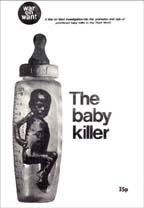 Six civil society groups at the first drafting meeting formed IBFAN to coordinate their efforts to protect infant health. Today there are more than 200 groups in over 100 countries. At the celebrations in Geneva representatives came from 24 European countries, plus the Coordinator of IBFAN Africa. A special guest was Andrew Chetley, who was working for War on Want (part of the Baby Milk Action Coalition) in 1979 and had earlier designed the cover of The Baby Killer (follow link to download pdf) published in 1974.
Six civil society groups at the first drafting meeting formed IBFAN to coordinate their efforts to protect infant health. Today there are more than 200 groups in over 100 countries. At the celebrations in Geneva representatives came from 24 European countries, plus the Coordinator of IBFAN Africa. A special guest was Andrew Chetley, who was working for War on Want (part of the Baby Milk Action Coalition) in 1979 and had earlier designed the cover of The Baby Killer (follow link to download pdf) published in 1974.Nestlé sued the Swiss publishers of this exposé of its formula marketing practices when they translated the title into German as Nestlé kills babies. The trial was a Public Relations disaster for Nestlé as experts trouped into court to substantiate the claims in the booklet. Nestlé eventually dropped all challenges, except that against the German title. Token fines were awarded to Nestlé, on the grounds it was not committing deliberate murder, but the judge warned it to change its marketing practices. but the judge warned it to change its marketing practices.
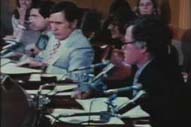 The publicity led to the Nestlé boycott in 1977 and a Senate hearing called by Senator Edward Kennedy in 1978 (click here for a video clip), where he grilled company executives. Famously Nestlé stated it had no responsibility if people were using its formula in conditions that led to their babies dying.
The publicity led to the Nestlé boycott in 1977 and a Senate hearing called by Senator Edward Kennedy in 1978 (click here for a video clip), where he grilled company executives. Famously Nestlé stated it had no responsibility if people were using its formula in conditions that led to their babies dying.
Following these hearings, Senator Kennedy (who passed away in September 2009) and others called for an international marketing code, and in 1979 WHO/UNICEF convened the landmark meeting which lead to the Code’s formation. The Code was adopted in 1981 despite the industry’s best efforts and the USA voting against. It took until 1994 for the USA to give its support for the Code, supporting the Resolution in that year that recalled the Code, and other Resolutions since.
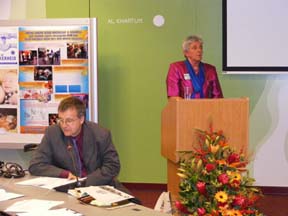 IBFAN has grown and works to implement the Code and subsequent, relevant Resolutions in national measures. Annelies Allain, Director of IBFAN’s International Code Documentation Centre and a founder member of IBFAN (pictured left with Andy Chetley), has led efforts to train policy makers on the measures. Ellen Sokol, author of The Code Handbook, the authoritative text on implementation, was also present at the celebration. Also present was Dr Halfdan Mahler, Director General of WHO from 1978 to 1988, who played a hugely important role in the Code’s formation.
IBFAN has grown and works to implement the Code and subsequent, relevant Resolutions in national measures. Annelies Allain, Director of IBFAN’s International Code Documentation Centre and a founder member of IBFAN (pictured left with Andy Chetley), has led efforts to train policy makers on the measures. Ellen Sokol, author of The Code Handbook, the authoritative text on implementation, was also present at the celebration. Also present was Dr Halfdan Mahler, Director General of WHO from 1978 to 1988, who played a hugely important role in the Code’s formation.
Annelies launched the latest State of the Code by Country report, showing that 63 countries have implemented most or many of the provisions of the Code and Resolutions. This does not include the majority of the European Union countries which have been down graded to having only some provisions in legislation.
Key-note speaker, Prof. Zulfiqar A. Bhutta (coauthor Child Survival series in The Lancet and of The Aga Khan University, Pakistan) related the latest statistics and the importance of community interventions to support breastfeeding in Pakistan.
Messages of support
“War on Want is proud to have been one of the first organisations to lead the fight against multinational baby food companies. Our 1974 report,‘The Baby Killer’, drew attention to the irresponsible promotion of breastmilk substitutes in the developing world, and its devastating impact on child health. War on Want congratulates IBFAN on maintaining the struggle over the past 30 years. May we and all the world’s children see many more victories in the years to come.”
John Hilary, Exec Director, War on Want
“IBFAN has done a tremendous job in the promotion and protection of breastfeeding in the last 30 years. Congratulations on your birthday!”
Jasmine Whitbread, Chief Executive, Save the Children UK
“The CPHVA is proud to have had such a long association with IBFAN, the Baby Feeding Law group and to have endorsed the Nestle Boycott.”
Angela Roberts, Chair NPC CPHVA/Unite.
IBFAN’s experience
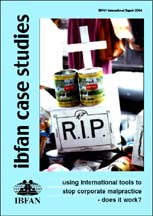 The 2004 report Checks and Balances in the Global Economy: Using international tools to stop corporate malpractice - does it work? examined 7 cases-study countries and found the industry lobbied aggressively against regulations.
The 2004 report Checks and Balances in the Global Economy: Using international tools to stop corporate malpractice - does it work? examined 7 cases-study countries and found the industry lobbied aggressively against regulations.
In some countries the industry lobby won through, but in others civil society organisations succeeded in protecting infant health. Provides useful lessons to others. (Where industry won, there are still useful lessons to be learned.)
IBFAN Europe meeting
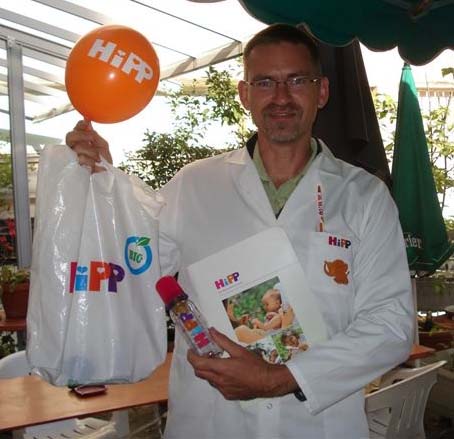 European IBFAN groups held their meeting after the celebration, sharing experiences and the latest information on infant feeding. Eastern Europe is, once again, a concern. Hipp, the German formula company even appears to sponsor doctors.
European IBFAN groups held their meeting after the celebration, sharing experiences and the latest information on infant feeding. Eastern Europe is, once again, a concern. Hipp, the German formula company even appears to sponsor doctors.
Left: Baby Milk Action’s Mike Brady wearing a Hipp doctor coat.






